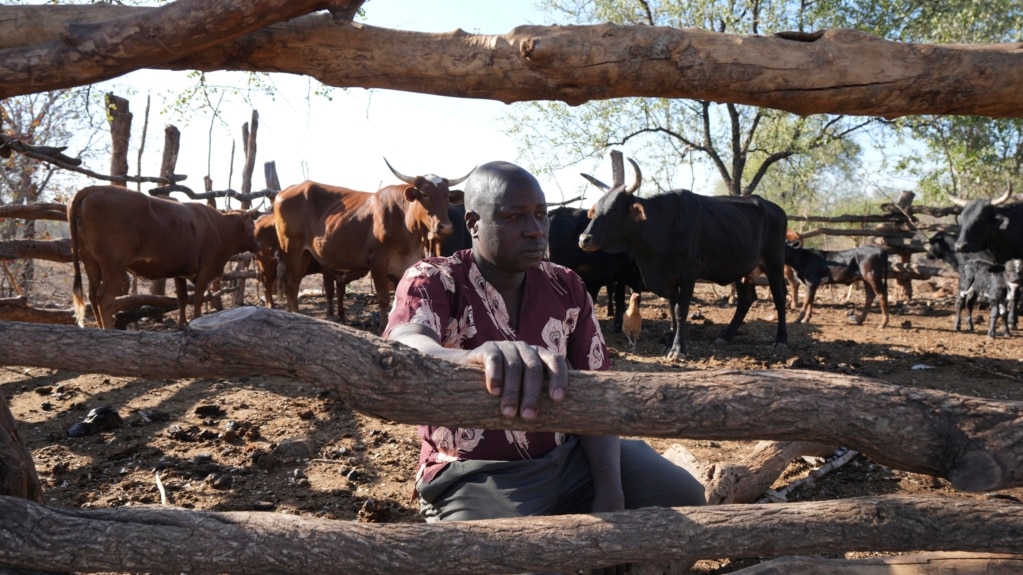A Zimbabwean who formerly hunted animals illegally is now in a program that turns such poachers into protectors of wildlife.
Forty-seven-year-old Tembanechako Mastick grew up hunting, a tradition in his community. He also planted crops and raised farm animals, or livestock. But dry weather conditions made farming less profitable. So, he turned to illegal hunting, also called poaching.
Then, last year, he got caught. Mastik had poached some small game from Savé Valley Conservancy. It is one of the largest private game reserves in Africa. Mastick was jailed for nearly three months.
Now, he is in a program that aims to turn poachers into conservationists.
Recently, Mastick was with a group of men. They found the den of some hyenas that had recently attacked livestock. The bones of the goats showed what happened. Some of the men suggested using fire to burn any hyenas remaining in the den. But Mastick warned against killing the animals, whether for revenge or for meat.
He said, “I began to realize that animals are for the benefit of the entire community, so poaching is a selfish act.”
Spreading that message is not easy. Across southern Africa, conflict between humans and wild animals is increasing. Dry weather, illegal hunting, tree-clearing, and the changing of forest to farmland have pushed wildlife closer to people.
Elephants raid vegetable gardens. Lions, hyenas, wild dogs and jackals target cattle and goats of farmers. Donkeys that work on farms are not safe either.
Zimbabwe’s parks agency said it has received three to four thousand calls about wildlife problems in the past three years. Tinashe Farawo of the Zimbabwe National Parks and Wildlife Management Authority said the conflicts are likely to increase during the dry months ahead.
Mastick remembers when there were good harvests of corn, millet and cotton. The wild animals stayed in the forest back then.
He said the problems began after the country’s land reform program went into effect in 2000. People started farming on land held by the Savé Valley Conservancy. The Conservancy said it lost 30 percent of the wildlife habitat on its 303,000 hectares of land.
At the same time, drought hit Mastick’s village. “…Lions began targeting our livestock. Elephants also became a problem, hyenas too,” he said. There was not enough land to feed livestock, and people from neighboring villages crossed into the reserve to get wood.
Dingani Masuku of the conservancy said, “All resources are scarce. So we have to compete (with animals) for those resources…The resources are getting leaner and leaner.”
Mastick often has to calm angry villagers who have lost livestock. He knows about the problem. He starts each day by counting his own cattle, goats and donkeys. Once he had 45 goats. Now, he has only 10. Wild animals have eaten the rest. Mastick himself has bites from animals including from a leopard attack.
“Without crop harvests we have to turn to livestock to raise money for school fees, food and other necessities so people are justified to be angry,” he said. But he added, “I help them understand that killing the animals is not the solution.”
Part of his message is that jail is difficult. His family suffered while he was in prison because he had been the family’s only earner.
Several of his 20 children stopped going to school.
But in jail, he learned new skills including carpentry. Now, he makes chairs and tables in his workshop that have been popular with visitors and locals. Men visit his workshop, and Mastick tells them about conservation. He also speaks at village gatherings, funerals and community meetings.
There is no information about poaching in the area. But Mastick believes the number of poachers has dropped since he started his efforts.
Masuku of the Conservancy said people believe Mastick and gain hope from his work as a carpenter.
He said, “People know that he has been through it, he has been there and that poaching does not pay and that is why he is reforming.”
I’m Mario Ritter, Jr.

